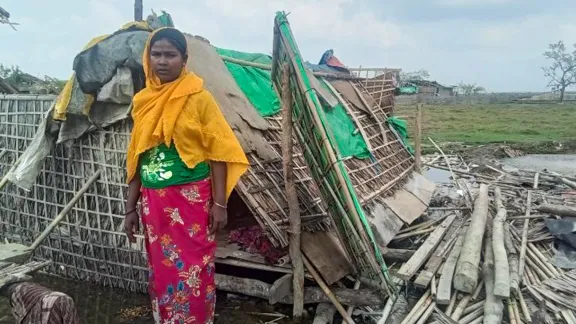Cyclone Mocha has caused massive devastation in the camps for internally displaced people and for people living villages in Myanmar’s Rakhine state. LWF is responding through its staff whose homes were also damaged by the storm and collaborating with other operational actors.

Daw Raw Bi Tu in front of her destroyed home near Sittwe, Myanmar. Photo: LWF Myanmar
Lives lost, homes destroyed and needs on the rise
(LWI) - One week after Cyclone Mocha devastated the coast of Myanmar, the damage has become more visible.
“Almost 80 percent of the homes in the Rohingya displacement camps have been completely destroyed, and the remaining require repairs,” says Hari Awasthi, LWF Area Coordinator for Rakhine State, Myanmar. “Some of the people lost their family members. The displaced families have built temporary shelters under tarpaulins, or sleep in their damaged homes or the mosque. Women and girls feel unsafe in that situation.”
LWF is coordinating its activities to reach those in need. However, it is a race against the clock, as the rainy season is about to start. Tarpaulins and damaged homes will not be sufficient to shelter the people from the strong daily rains that come with the season.
LWF Myanmar works in camps for internally displaced Rohingya, internally displaced Rakhine, and their host communities, altogether in 58 locations in Rakhine state. The assessment of casualties is still ongoing, Awasthi says.
“People are desperate”
Many residents of the camps sheltered with relatives, in mosques, monasteries or other safe places during the storm. Coming back, they found their homes destroyed, livestock killed, and food reserves spoilt. “We stayed with relatives on higher ground, we were afraid the storm would kill us all”, says Mrs. Raw Bi Mar Har Tu from Pauktaw township. When she returned, her home for the family of nine was in ruins. The family, like many other inhabitants of the camp, lost everything.
The communities in the camps urgently need shelter, safe drinking water, food, medical supplies and health care services.
Hari AWASTHI, LWF Program Coordinator Rakhine State
Awasthi and his team are particularly worried about water-borne diseases in the still flooded camps. “The communities in the camps urgently need shelter, safe drinking water, food, medical supplies and health care services,” Awasthi says.
“People are desperate”, Awasthi says. “They urgently need help.”
“We started our humanitarian assistance after the 2008 Cyclone Nargis hit Myanmar also hard, and the devastating impact that had on the country. It is heartbreaking to see it happening again”, says David Mueller, LWF Myanmar Country Representative.
“We are concerned about the long-lasting impact of this cyclone on so many people in the country. The storm has heavily affected our hundreds of staff, whose houses are also severely damaged and who try to support the work in the best way possible under these challenging circumstances.”
LWF Myanmar puts the people of Myanmar at the center of all its interventions and directly reaches around half a million of people every year. LWF provides humanitarian assistance in Myanmar through livelihood development, WASH and work in several camps like providing support to fire safety in houses, entrepreneurship skills development, start-up businesses like tailoring, beauty salons and small restaurants.


